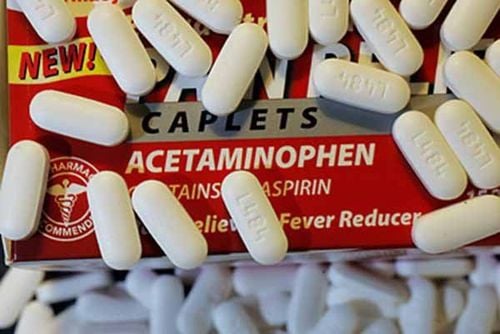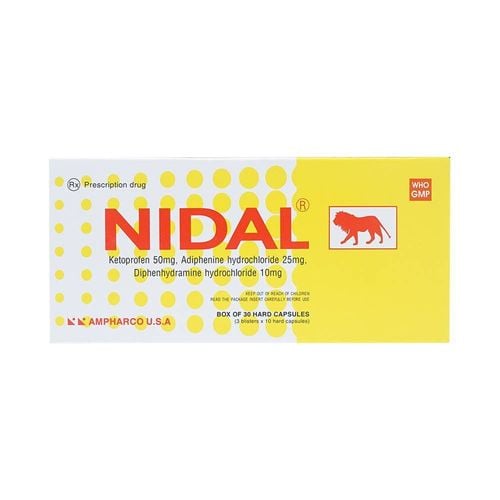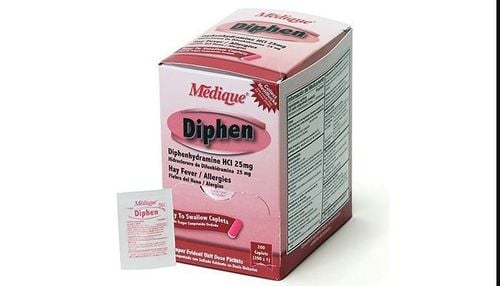This is an automatically translated article.
Nawtenim, whose active ingredient is diphenhydramine, is an antihistamine that works by reducing the effects of the natural chemical histamine in the body. Histamine can produce symptoms of sneezing, itching, watery eyes, and runny nose. Thereby, the drug can improve these manifestations as well as be used to treat motion sickness, induce sleep and treat some symptoms of Parkinson's disease.1. What is Nawtenim?
Nawtenim is the trade name for the ingredient diphenhydramine. It is a first generation receptor antihistamine widely used to treat seasonal allergies, insect bites and stings that cause hives. However, the drug also has antiemetic, antitussive, sedating and ameliorating Parkinson's symptoms.Since histamine receptors exist both peripherally and in the central nervous system, diphenhydramine has been shown to induce sedation due to competitive antagonism of histamine H1 receptors in the central nervous system. . Although the use of diphenhydramine in the treatment of allergies can sometimes be unpopular due to its sedative effects, it is still used with many over-the-counter sleeping pills as a way to help patients sleep more easily. safe way.
Besides, diphenhydramine is also used in combination with 8-chlorotheophylline as an anti-nausea drug. In this role, dimenhydrinate has a major mechanism of action on the antagonism of histamine H1 receptors in the vestibular system, which improves symptoms of motion sickness.
In addition, diphenhydramine has also been shown to be involved in several neurotransmitter systems that influence behavior including dopamine, norepinephrine, serotonin, acetylcholine, and opioids. Therefore, this chemical component is still being studied for its antidepressant effects with the lowest possible adverse effects.

Nawtenim giúp cải thiện triệu chứng say tàu xe
2. What are the uses of Nawtenim?
Nawtenim, or diphenhydramine, is an antihistamine used to relieve symptoms of allergies, hay fever, and the common cold. These symptoms include rash, itching, watery eyes, itchy eyes/nose/throat, cough, runny nose in allergic rhinitis, and sneezing. It is also used to prevent and treat nausea, vomiting, and dizziness caused by motion sickness. In addition, diphenhydramine can also be used to help people relax and fall asleep.Diphenhydramine products intended to help with coughs and colds have not been shown to be safe or effective in children younger than 6 years of age. Therefore, do not use this product to treat cold symptoms in children under 6 years of age unless specifically directed by a doctor. Some other dosage forms such as long-acting tablets and capsules are also not recommended for use in children under 12 years of age. Therefore, before taking the medicine, consult your doctor or pharmacist for more details about using the medicine safely.
On the other hand, diphenhydramine only improves symptoms but does not cure or shorten the duration of common colds and allergies. At the same time, the drug also has the potential to cause significant side effects if used arbitrarily for a long time. Therefore, the drug should only be used for a short period of time when symptoms occur; If symptoms do not improve or persist, it is necessary to visit a doctor for proper diagnosis and treatment.
3. What is the dose of Nawtenim?
The dose of Nawtenim with the active ingredient diphenhydramine is different in adults and children, in different situations:Usual adult dose for motion sickness Oral formulation: 25 to 50 mg, orally 3 to 4 times a day, with the first dose being 30 minutes before travel and repeated before meals to avoid motion sickness during the journey.
Usual Adult Dose for Allergic Rhinitis Oral Tablets:
Diphenhydramine Citrate: 38 to 76 mg orally every 4 to 6 hours as needed. Maximum dose: 456 mg/day
Diphenhydramine Hydrochloride: 25 to 50 mg orally every 4 to 6 hours as needed. Maximum dose: 300 mg/day
Usual Adult Dose for Cold Symptoms Oral Tablets:
Diphenhydramine Citrate: 38 to 76 mg orally every 4 to 6 hours as needed. Maximum dose: 456 mg/day
Diphenhydramine Hydrochloride: 25 to 50 mg orally every 4 to 6 hours as needed. Maximum dose: 300 mg/day
Usual Adult Dose for Itching Oral Tablets:
Diphenhydramine Citrate: 38 to 76 mg orally every 4 to 6 hours as needed. Maximum dose: 456 mg/day
Diphenhydramine Hydrochloride: 25 to 50 mg orally every 4 to 6 hours as needed. Maximum dose: 300 mg/day
Usual Adult Dose for Urticaria Oral Tablets:
Diphenhydramine Citrate: 38 to 76 mg orally every 4 to 6 hours as needed. Maximum dose: 456 mg/day
Diphenhydramine Hydrochloride: 25 to 50 mg orally every 4 to 6 hours as needed. Maximum dose: 300 mg/day
Usual adult dose for extrapyramidal reactions Oral formulation: 25 to 50 mg orally 3 to 4 times a day
Infusion: 10 to 50 mg IM or IV as needed and can be increased to 100 mg if needed. Maximum dose: 400 mg/day
Usual Adult Dose for Insomnia Oral Tablets:
Diphenhydramine Citrate: 76 mg orally once a day at bedtime
Diphenhydramine Hydrochloride: 50 mg orally once a day at bedtime Sleep
Dosage of diphenhydramine in children should be consulted with a specialist, suitable for diagnosis and appropriate dosage, in order to improve symptoms and limit unwanted effects.

Các tác dụng phụ có thể gặp phải khi uống diphenhydramine là buồn ngủ, chóng mặt
3. Possible side effects when taking diphenhydramine
When using diphenhydramine, whether in different dosage forms, including mixed powder, injectable solution, oral tablet, long-acting tablet, chewable tablet, there are potential for certain side effects as follows:The most commonly reported adverse events were somnolence, dizziness, and lethargy. In particular, drowsiness usually decreases after a few days of stopping the drug.
Effects by system organ system:
Nervous system Common (1% to 10%): Sedation, somnolence, dizziness, headache, attention disturbance
Rare (0.01% to 0. 1%): Extrapyramidal effects, tremor, convulsions
Very rare (frequency not reported): Paresthesias, dyskinesias, muscular disorders, neuritis, mental impairment, activation epileptic syndromes
Psychiatric system Rare (0.01% to 0.1%): Confusion, depression, sleep disturbance
Very rare (frequency not reported): Excitement, agitation, increased energy, restlessness, nervousness, excitement, anxiety, hallucinations, insomnia, irritability
Digestive system Common (1% to 10%): Dry mouth
Very rare (frequency not reported). ): Gastrointestinal disorders, nausea, vomiting, constipation, diarrhea, dyspepsia, epigastric pain
Cardiovascular system Rare (0.01% to 0.1%): Palpitations, hypotension, confusion arrhythmia
Very rare (frequency not reported): Tachycardia, chest tightness, extrasystoles
Hematology Rare (0.01% to 0.1%): Blood disorders
Very rare ( frequency is not reported): Hemolytic anemia, thrombocytopenia, agranulocytosis
Drug hypersensitivity Rare (0.01% to 0.1%): Hypersensitivity reactions
Very rare (frequency not reported) : Angioedema, anaphylaxis
Liver Rare (0.01% to 0.1%): Liver dysfunction
Dermatology Very rare (frequency not reported): Rash, urticaria, rash skin, erythema, photosensitivity, pruritus, excessive sweating
Respiratory system Very rare (frequency not reported): Shortness of breath, increased bronchial secretions, wheezing, nasal congestion, dry nose or throat
Genitourinary system Very rare (frequency not reported): Urinary retention, dysuria, early menstruation
Eyes Very rare (frequency not reported): Blurred vision, dry eyes, double vision
Transition Very rare (frequency not reported): Increased appetite, anorexia
Musculoskeletal very rare (frequency not reported): Convulsions, muscle weakness
Briefly, Nawtenim, brand name diphenhydramine , is indicated to relieve symptoms caused by increased levels of histamine in the body. However, the real cause of the conditions remains untreated. Therefore, in addition to the acute symptoms that can be self-administered, the long-term use of the drug should be subject to specialist advice to limit unwanted effects.
Vinmec International General Hospital is a high-quality medical facility in Vietnam with a team of highly qualified medical professionals, well-trained, domestic and foreign, and experienced.
A system of modern and advanced medical equipment, possessing many of the best machines in the world, helping to detect many difficult and dangerous diseases in a short time, supporting the diagnosis and treatment of doctors the most effective. The hospital space is designed according to 5-star hotel standards, giving patients comfort, friendliness and peace of mind.
Please dial HOTLINE for more information or register for an appointment HERE. Download MyVinmec app to make appointments faster and to manage your bookings easily.












